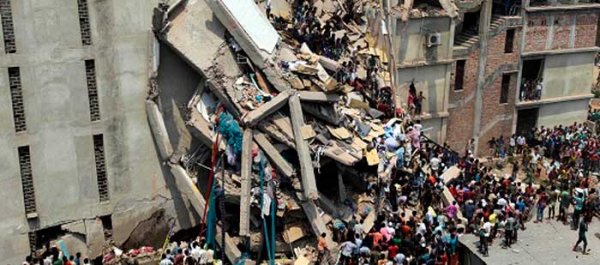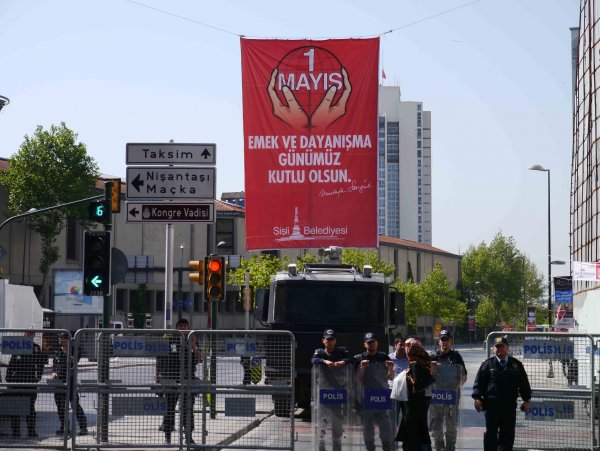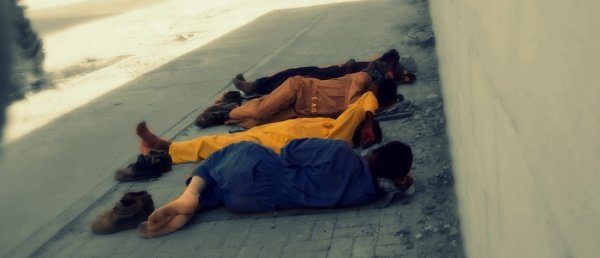| ITUC E-news is produced by the International Trade Union Confederation |
 |
May 6, 2013: The global union movement has welcomed the European Commission’s commitment to press Bangladesh to meet international labour standards.
European Commissioners Catherine Ashton and Karel De Gucht made the pledge in a joint statement following the horrific building collapse in Savar, Bangladesh that has claimed some 600 lives and left many more seriously injured in one of the world’s worst industrial disasters. The threat of EU action under the Generalised System of Preferences (GSP), rarely invoked, further underscores the concern.
“The EU should use its considerable leverage to encourage brands sourcing from Bangladesh to sign up to a binding and enforceable agreement on fire and building safety, in which workers and trade unions play an active role,” said Jyrki Raina, General Secretary of IndustriALL Global Union.
“The industry’s promotion of corporate auditing to identify and remedy problems is yet again revealed as a cruel hoax, as corporate auditor BSCI had recently certified factories operating in the Rana Plaza building,” said Raina. “A voluntary approach that relies merely on corporate goodwill – which has been largely absent – would be a mistake. Promotion of more corporate auditing is no solution to the problem,” said Raina.
Sharan Burrow, ITUC General Secretary, said “Once again, workers have paid with their lives for the cosy but ultimately lethal relationships between global brands, ruthless suppliers and corrupt politicians in Bangladesh. The EU must follow through on its pledge, and act to stop the sham corporate CSR industry doing any more damage.”
The factories in which garments are produced in Bangladesh for the leading global retailers are well known to be death traps. The situation is made worse by the complete hostility towards trade unions by both the government and garment producers’ associations in Bangladesh. The government has for years refused to register unions in the garment sector. Only due to substantial international pressure have new unions begun to receive legal recognition in the past months.
Philip Jennings, general Secretary of UNI Global Union which organises workers in the retail sector, said “UNI and its affiliates are demanding that retailers around the world sign an enforceable agreement which protects workers in Bangladesh from the unacceptable dangers of fire and building hazards and ensures these workers will have full access to the best form of health and safety protection: a union. They can’t hide from their responsibility – the time to step up to a real agreement is now.”
The ITUC, IndustriALL Global Union and IndustriAll European Trade Union say that the EU must also not view the situation as a safety and health matter alone. If workers have a strong union, it is far more likely that they will be able to negotiate for safer workplaces and to remove themselves from danger quickly when it arises. The EU must therefore ensure that freedom of association is at the centre of any engagement with the government. Along with this, pressure must be put on the industry and the government, to ensure that workers are paid a living wage. The government, under employer pressure, has refused to raise the $36 minimum monthly wage.
“New legislation that complies with ILO standards and the efficient registration of new unions will be vital to avoid future tragedies. The current labour code amendments recently passed by the cabinet leave many issues raised by the ILO and trade unions regarding freedom of association wholly unaddressed,” said Sharon Burrow.
“The EU must also insist that those responsible for the torture and murder of trade union activist Aminul Islam last year be arrested and prosecuted without further delay,” said Burrow.
Bernadette Ségol, General Secretary of the European Trade Union Confederation (ETUC) calls on the Commission to adopt a new strategy for the Corporate Social Responsibility programme 2011-2014. “We must ensure that all multinationals operating in Europe commit to respecting the International Labour Organisation’s declaration on tripartite principles concerning multinational enterprises and social policy. “
A recent report by the US trade union centre AFL-CIO “Responsibility Outsourced” details the appalling track record of corporate-backed “social audit” firms, including other cases where auditors failed to act on fatally dangerous factories and helped companies with US-style union avoidance strategies.
Press contacts:
IndustriALL: Tom Grinter +41 79 6934499.
IndustriALL Europe: Luc Triangle on +32 (475) 257 236
UNI : Richard Elliot: +41 79 794 9709
ETUC: Patricia Grillo: + 32 2 224 04 30
ITUC: +32 2 224 02 04
 |
May 1, 2013: I came to Istanbul to take part in the biggest May Day rally in Europe, to join the celebration and to support the determination of Turkish unions to fight for legislative implementation of labour rights.
Workers planned to gather in Taksim Square, the ceremonial site of the struggle since 1977, a place people celebrate and remember the people who were shot and killed in this very square in 1977 as they celebrated May Day.
But this year the Turkish Government showed that democracy is not genuine as they were determined to blockade workers from gathering in Taksim Square.
Thousands of riot police, army and special forces lined the streets. Tear gas, pepper spray and water cannons have been used to break up groups as small as 3 or 4 people.
Jammers are being used to block mobile phones so people cannot use twitter or text to arrange meeting places.
Two of our union headquarters are under siege with injured workers inside.
This is democracy under threat.
The legacy of today oppression will be long lasting in the hearts and minds of workers. The Turkish Government has been shamed in the eyes of the world. This brutal crackdown by the government to stop our brothers and sisters celebrating May Day has unmasked the truth face of the Turkish Government.
There is no place for this behaviour from a country which will be taking on the leadership of the G20 in 2015. (G20 The Group of Twenty, or G20, is a forum for international cooperation on the most important aspects of the international economic and financial agenda. It brings together 19 countries and the European Union, which together represent around 90% of global GDP, 80% of global trade and two thirds of the world’s population.)
April 30, 2013: The Arthur Svensson International Prize for Trade Union Rights for 2013 has been awarded to Russian trade union leader Valentin Urusov.
On 15 March 2013, the ITUC welcomed the release of Valentin Urusov. In early 2008, Urusov, a miner and trade union leader, was detained by the authorities for alleged narcotics possession. However, his arrest coincided suspiciously with preparations for a protest rally by workers at the state-owned Alrosa diamond mining company – a rally which Urusov helped organise. He was sentenced to six years in a penal colony.“We are glad that Valentin Urusov has won the prize,” said Sharan Burrow, ITUC General Secretary. “We strongly supported him during his time in prison and we will do so with every trade unionist illegally detained.”
 |
24 April 2013: A discredited ‘Corporate Social Responsibility’ (CSR) approach is being used to paper over the cracks of Qatari labour law, which is failing to protect migrant workers, warns the International Trade Union Confederation (ITUC).
Sharan Burrow, General Secretary, ITUC, said Qatar is a state being managed as a corporation, as the Government fails to take responsibility for workers in the country.
A raft of ‘workers’ charters’ have been announced from the Qatar Foundation and Q22 Supreme Committee, yet none of these documents have been released to the public or discussed with unions, and workers remain in the dark about their rights.
“Qatar, the world’s richest country per capita, is using the CSR model used by multinationals in developing countries that has cost hundreds of lives – most recently in factory fires in Bangladesh.
“Starting on the CSR path, without addressing the weakness of the labour law, is bad for workers, bad for business and bad for the country,” said Sharan Burrow.
The charters are subject to national Qatari laws – which do not meet UN international standards. The ITUC has written to the Qatar 22 Supreme Committee expressing disappointment with the process and content of their Workers’ Charter.
“Migrant workers in Qatar are no more protected by these charters than they are under Qatari law.
“International unions will continue to campaign for all workers in Qatar to have the right to form and join a union and collective bargain – rights enshrined in international standards,” said Sharan Burrow.
The pressure for Qatar and Gulf countries to address abuses of workers has been growing in recent months.
A new study on human trafficking by the International Labor Organisation (ILO) showed expat workers in the Middle East are among the most likely group of people to become victims of forced labour.
The report highlighted the restrictive Kafala (sponsorship) system as “inherently problematic” creating an unequal power dynamic between employer and worker.
“Loopholes in the Qatari labour law mean that migrant workers in Qatar are not allowed to end unfair employment contracts or change employers, creating conditions of 21st century slavery.
“Reform of Qatari labour law to meet international standards is the only way to give workers in Qatar their rights,” said Sharan Burrow.
The ITUC has released a new information campaign to highlight the conditions of migrant workers, and their treatment under Qatar laws at www.rerunthevote.org
For interviews with Sharan Burrow contact:
Gemma Swart gemma.swart@ituc-csi.org +32 479 06 42 63
2013 is giving us a shameful death toll in workplace fatalities and accidents.
26 April 2013: 2013 is giving us a shameful death toll in workplace fatalities and accidents. No later than Tuesday we had to deplore the deaths of over 200 Bangladeshi garment workers following the collapse of their workshop in Savar on the outskirts of Dhaka.
This tragic event takes place just days before workers across the world unite on the International Commemoration Day for Dead and Injured Workers to commemorate the victims of employers’ reckless behaviour.
What happened in Savar was not an “accident”.
“We receive reports of workers dead, injured or suffering from diseases contracted at their workplaces every day – and even if chronically underreported in official statistics, experts estimate that around a million workers get injured every day! What are governments looking at? Don’t they realise that there is a systemic failure when working people have to choose between their own lives and their families’ bread on a daily basis?” asked Sharan Burrow, the General Secretary of the International Trade Union Confederation, one of the promoters of the Commemoration Day.
In addition to the hundreds of thousands of deaths associated with workplace accidents, we must also remember those who die from occupational diseases such as work-related cancers. The World Health Organisation estimates the annual death toll from asbestos-related diseases at 107,000 each year.
“When workers in Savar this week tried not to go back to their workplace, arguing about the risks they incurred, their claims were ignored, their voices fell on deaf ears, and this workplace became the graveyard of hundreds of their fellow colleagues,” said Burrow. “Proper union representation, training, respect and independence for occupational health and safety committees, on-the-ground knowledge of workers – these are all key for these events not to occur in the 21st century.”
Although this shocking tragedy happened in a developing context, the situation in the developed world is not improving. In the name of competitiveness and public deficit reduction, governments are implementing austerity measures that are eating away at vital regulatory instruments that protect workers and their families.
“Rather than slashing social benefits or public services, leaders should be focusing on the huge cost for the State of letting this massacre go on and focus on prevention and strong health and safety regulation and enforcement,” Burrow concluded.
Migrant workers in Qatar have no labour rights, wages are exploitative and occupational health and safety risks are extreme. Several hundred die each year, and the death and injury toll is rising as the huge 2022 World Cup gathers pace.
Through the International Workers’ Memorial Day, the ITUC hopes to shed light on the crucial role played by trade unions, strong regulation and effective enforcement in securing safer workplaces.
See also Bhupendra’s story, an injured worker from Qatar
Notes to editors